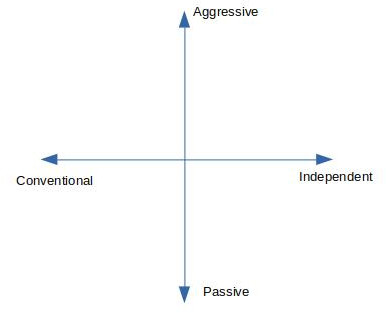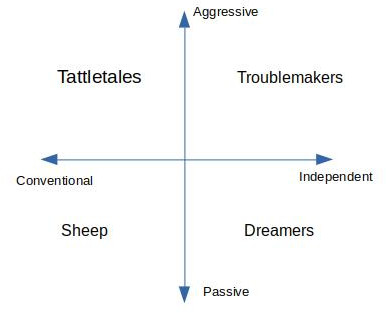-
For the second day in a row, Mr. Ramirez provides our eye candy:
I recommend clicking through for a full-size version. And if you need more information on what it's about, see the Free Beacon (with amusing video).
Yuval Levin has a book out, A Time to Build, where he argues that many American institutions (definitely including Congress) are "not formative but performative". Where the denizents go to act, rather than be. I think it's on my TTR list.
-
Paul Graham's latest essay is
The Four Quadrants of Conformism.
One of the most revealing ways to classify people is by the degree and aggressiveness of their conformism. Imagine a Cartesian coordinate system whose horizontal axis runs from conventional-minded on the left to independent-minded on the right, and whose vertical axis runs from passive at the bottom to aggressive at the top. The resulting four quadrants define four types of people. Starting in the upper left and going counter-clockwise: aggressively conventional-minded, passively conventional-minded, passively independent-minded, and aggressively independent-minded.
Calls out for illustration. Pretty easy with LibreOffice Draw:

And let's think of some more, um, descriptive labels…
Young children offer some of the best evidence for both points. Anyone who's been to primary school has seen the four types, and the fact that school rules are so arbitrary is strong evidence that the quadrant people fall into depends more on them than the rules.
The kids in the upper left quadrant, the aggressively conventional-minded ones, are the tattletales. They believe not only that rules must be obeyed, but that those who disobey them must be punished.
The kids in the lower left quadrant, the passively conventional-minded, are the sheep. They're careful to obey the rules, but when other kids break them, their impulse is to worry that those kids will be punished, not to ensure that they will.
The kids in the lower right quadrant, the passively independent-minded, are the dreamy ones. They don't care much about rules and probably aren't 100% sure what the rules even are.
And the kids in the upper right quadrant, the aggressively independent-minded, are the naughty ones. When they see a rule, their first impulse is to question it. Merely being told what to do makes them inclined to do the opposite.
So here you go:

I see this a something that might be illuminating in a job interview: "Where do you see yourself on this graph? Where do you see yourself in five years?"
Probably also grounds for a lawsuit, if your interviewee is in the upper-left.
-
At Reason, Jacob Sullum shakes his head in befuddlement:
Linda Greenhouse Thinks COVID-19 Rules That Favor Casinos Over Churches Raise No Constitutional Issues Worth Considering.
Linda Greenhouse, who covered the Supreme Court for The New York Times from 1978 to 2008, was "startled" by the sympathy that four justices recently expressed for a Nevada church's challenge to the state's 50-person cap on religious services. In an op-ed piece published today, Greenhouse argues that the justices' dissent from last Friday's decision against granting Calvary Chapel in Dayton an injunction pending appeal irrationally elevates religious concerns above public health. She says the dissenting justices—Samuel Alito, Clarence Thomas, Neil Gorsuch, and Brett Kavanaugh—"appear oblivious to the facts on the ground, particularly the well-documented role of religious services in spreading the virus."
To the contrary, it is Greenhouse who seems oblivious to the facts—in particular, Nevada's arbitrary distinction between houses of worship and businesses that pose similar or greater risks of COVID-19 transmission. Those favored businesses include bars, restaurants, gyms, arcades, bowling alleys, and, most conspicuously, casinos, where thousands of people from around the country have been gathering to try their luck since Nevada Gov. Steve Sisolak allowed the gambling palaces to reopen on June 4. All of those businesses are permitted to operate at 50 percent of capacity, while churches, synagogues, and mosques may admit no more than 50 people at a time, regardless of their capacity. A church with seating for 500 people, for example, may not exceed one-tenth of its capacity.
Roll that around your brain for a few seconds: a past SCOTUS reporter for the New York Times apparently doesn't understand the religious liberty argument well enough to even disagree with it.
-
I alluded to this possible silver lining
a couple days
ago. David Henderson in the WSJ thinks:
The Virus May Strike Teachers Unions.
If you have school-age children, you may be wondering if they’ll ever get an education. On Tuesday the American Federation of Teachers, the second-largest education union, threatened “safety strikes” if reopening plans aren’t to its liking. Some state and local governments are insisting that public K-12 schooling this fall be conducted online three to five days a week and imposing stringent conditions on those students who actually make it to the classroom.
Yet there are three reasons to be optimistic about the future of education. First, many parents will be more prepared to home-school their kids than they were in the spring. They or their hired teachers will do a better job of educating children, in many cases, than the public schools.
Second, once the pandemic ends, many parents, perhaps millions, will have a new appreciation of how mediocre a job the public schools were doing. They will continue home-schooling, switch to a private school, or push hard to end restrictions on the growth of charter schools. Third, as schools sit empty and homebound teachers draw their regular salaries for less effective work, there will be more opposition to more funding for public schools, which, in turn, will make local school boards amenable to lower-cost options such as charter schools.
Probably paywalled. David has a summary at Econlib: The Coming Renaissance in K-12 Education. A waggish commentator notes that his governor forced car insurance companies to rebate some premiums to their customers, thanks to decreased driving. But good luck getting rebates on your taxes due to decreased use of government schools.
-
At Cato, Michael D. Tanner is not a fan of
Trump, Zoning, and Discrimination.
Exclusionary zoning has all sorts of consequences that lock people out of the middle class. Educational opportunities, for instance, are too often distributed by zip code, especially in the absence of meaningful parental choice. Exclusionary zoning too often “ghettoizes” the poor and people of color, forcing them into neighborhoods with few jobs, high crime rates, and bad schools. And, by driving up housing prices, it contributes to the soaring epidemic of homelessness in many areas of the country.
Now, President Trump has thrown his support behind those who want to keep affordable housing out of the suburbs. This week he announced an executive order making changes to the Affirmatively Furthering Fair Housing rule (AFFH), an Obama‐era requirement that localities take steps to combat housing discrimination in their communities. In isolation, it could be argued that the AFFH was unwieldy, unnecessarily intrusive, and in need of reform, but the administration’s actions appear to be part of a larger campaign by Trump and his supporters to block zoning reform that would make affordable housing more widely available in affluent communities. As Trump himself tweeted about his actions, “I am happy to inform all of the people living their Suburban Lifestyle Dream that you will no longer be bothered or financially hurt by having low income housing built in your neighborhood.”
Tanner is correct to dislike exclusionary zoning. But I think he ignores how AFFH was actually implemented. For example, in Dubuque, Iowa.
And I think his premise that there must be a Federal solution to exclusionary zoning is incorrect. Where in the Constitution are the Feds given the power to regulate such matters?
Unless, of course, there's a violation of civil rights. But I'm pretty sure that's not alleged.
![[Earwax]](/ps/media/mrz073020-color-1mb_orig.jpg)
![[The Blogger and His Dog]](/ps/images/me_with_barney.jpg)



